Waiting lists: More cash wanted to help older people manage pain
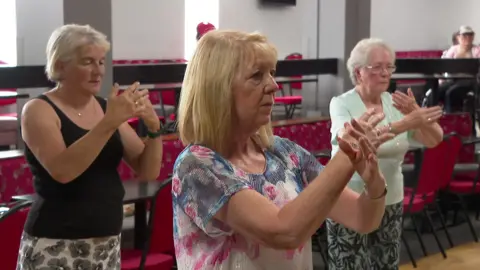 BBC
BBCExercise classes for older people waiting for treatment for muscle conditions should get more cash, a charity has said.
Waiting lists rose to more than 707,000 in April, with the latest figures on Thursday showing two solid years of growth since the pandemic.
Now Age Cymru wants to see long-term funding for schemes allowing more people to "wait well" for treatment.
The Welsh government said funding was helping to offer a range of services.
Orthopaedics and opthalmology are the areas with the largest numbers waiting and Age Cymru has warned more older people are "eating into their savings" by turning to private healthcare because they struggle to access NHS services.
Numbers of patient pathways in orthopaedics rose slightly overall in April, while those waiting more than nine months for treatment rose to more than 53,650.
Opthalmology lists rose again, to 84,563 waiting for treatment, with 38,256 waiting more than nine months and 8,803 more than a year.
The charity's annual survey findings showed almost two-thirds of people had problems or a negative experience related to their treatment.
Many said their physical wellbeing had irreversibly changed, with others worried about making ends meet as a result of turning to private healthcare.
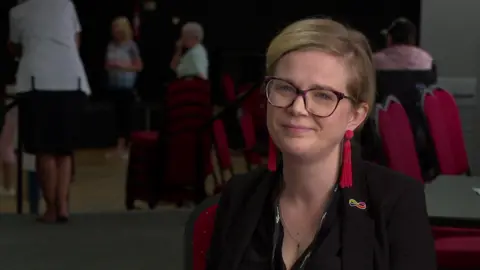
Heather Ferguson, head of policy and projects at Age Cymru, said their Tai Chi classes for the over-50s - funded by the Welsh government - had helped many people manage their conditions.
"It has a fantastic preventative role," she said, as well as "a real impact on their mental and physical wellbeing."
But with more people potentially facing years on waiting lists, Ms Ferguson said "pain management is going to be a key issue".
"This type of support is quite patchy across Wales and we'd like it to be more consistent so that people are able to access it at an early stage.
"We're grateful for funding from Welsh government to provide these classes, but what we really need is long-term, sustainable funding through third sector organisations for these to work long term."
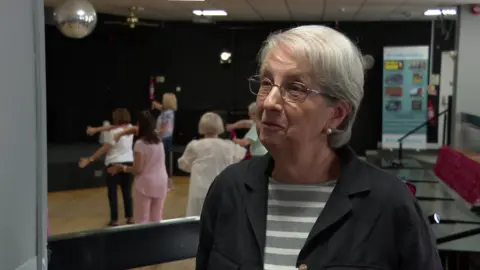
Elizabeth Weekley attends sessions in Cardiff and has a condition called polymyalgia rheumatica, which affects her muscles.
"I've been on steroids for 10 years and was gradually getting less mobile. When I first started I used to crawl upstairs. Now I can run up the stairs," she said.
"I'm not saying it's all Tai Chi, but it certainly helps."
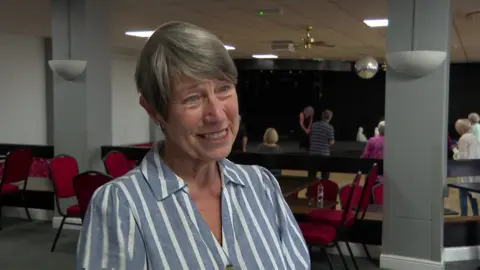
Madeleine Elliott, 73, said her biggest health challenge is fibromyalgia, which causes her muscle pain and chronic fatigue.
She said the class cannot take that away, but certainly helps.
"Things happen unfortunately with age, and once you reach a certain period you've got to find ways to help yourself," she said. "Otherwise you end up doing very little.
"I've fallen a few times recently - a little clumsiness - but this helps bring your balance back."
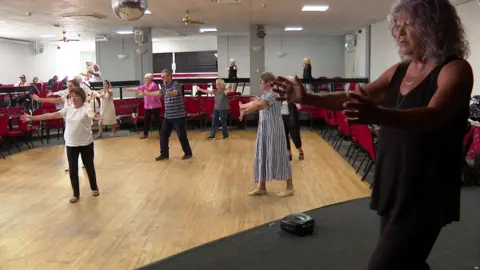
Linda Loveless said she's been waiting a year for steroid injections to help with a spinal problem.
"I find coming regularly does help - I'm in pain, but by the end of the [hour-long] class it'll be easing off.
"I'm asthmatic too and I find it helps with the breathing - that time to slow down and breathe does you a lot of good."
For 80-year-old Teresa Jegard, the classes have helped manage her osteoporosis and lung condition, but said she also valued the social interaction.
"Even in lockdown we met on the common - you've got to look after yourself, because otherwise it was four walls. Other than shopping, what did you do for two years?"
Volunteer instructor Corina Walker said the free class had members aged between 50 and 92.
"Because the exercises are gentle, you can't really do any harm to yourself and it benefits so many things. It's a joy to see people doing it."
How one hospital is tackling waiting lists
A new mobile cataract hub at the University Hospital of Wales in Cardiff has quadrupled the number of patients treated each month.
The £1.4m unit, funded by the Welsh government, has two operating theatres and sits in a former car park, separate to the main hospital building.
"Before the pandemic we were doing about 130 cataract operations per month and currently we're doing about 400 and aiming to increase even more if possible," said Seine Ng, clinical director of Cardiff Eye Unit.
"I think the patient journey itself is nicer as well. The ward areas are a lot larger, so patients feel more comfortable."
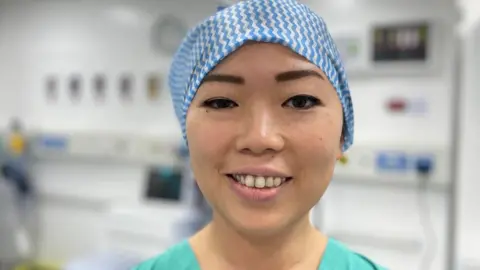
Dr Ng explained the extra space allows a more efficient flow of patients through the unit, with one patient being prepped while another is in theatre.
The overall ophthamology waiting list in Cardiff and Vale in April rose to 15,230, with 7,480 waiting more than nine months.
That's a 70% rise on pre-pandemic levels.
Dr Ng added that procedures are "getting more complicated" because of the waits patients have experienced.
"The cataracts are getting harder and more difficult to take out and so it can take a bit longer than a routine operation.
"A lot of patients are stopping their driving, they can't do things that they normally like to do.
"That all plays into our patients' quality of life. So we're aiming to try and improve that, to try and keep patients independent, driving, working."
A Welsh government spokesman said: "Our significant investment in planned care recovery is helping health boards across Wales to develop a range of approaches that will help people manage their conditions and access the right support when they need it."

- FIGHT FOR YOUR RIGHTS: X-Ray has got your back
- SPOTLIGHT ON THE NHS: Is Covid masking a bigger problem with our health service?

